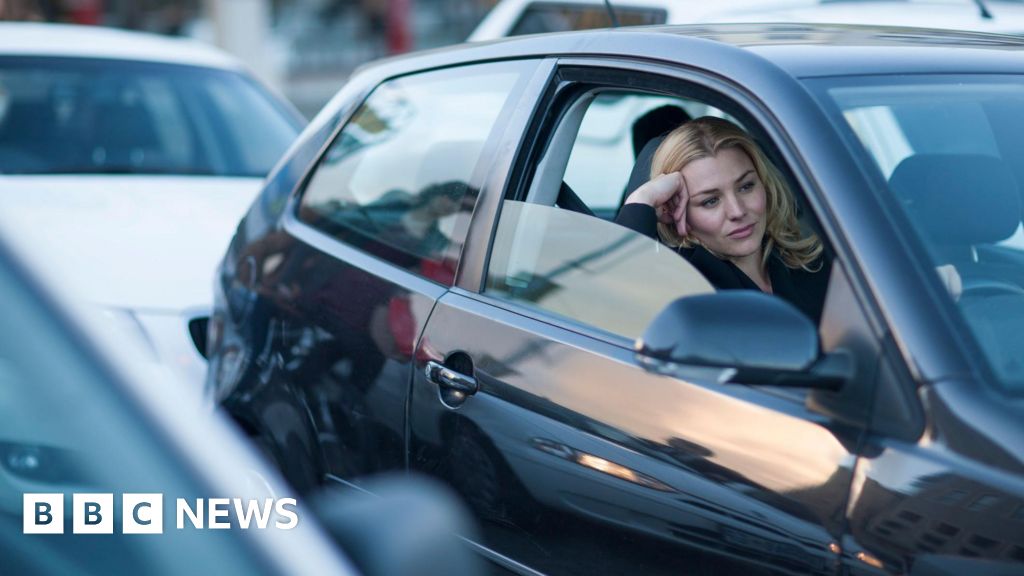 Getty Images
Getty ImagesThe kids have finished school and it’s time for the great summer getaway, with millions of Brits setting off on their holidays.
It’s likely to be a busy time on the roads, with the RAC predicting a “weekend of woe”.
The motoring organisation says some 13.8 million trips could be made between Friday and Sunday, making it the second busiest summer getaway weekend since 2015.
So what can you do to beat the queues? Whether you’re travelling by road, plane, train or ferry, here are some tips to help make your journey as smooth as possible.
On the roads
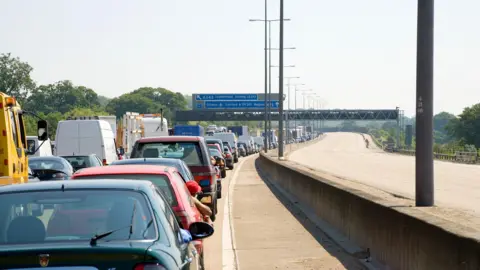 Getty Images
Getty ImagesDrivers are advised to avoid travelling between 12:00 and 17:00 on Saturday, and between 11:00 and 13:00 on Sunday. That is when travel experts INRIX expect the worst delays.
They say the best time to travel is after 18:00 on Saturday, or after 15:00 on Sunday.
Other tips from INRIX and the RAC include:
- Plan your route in advance, but also be prepared to make changes on the day if necessary
- Monitor news outlets and use route-planning apps for the most up-to-date travel information and live traffic updates
- If you suspect there’s something wrong with your car or it needs some routine maintenance, get the work done ahead of your holiday, to avoid breaking down while you’re away and losing holiday time
At the airport
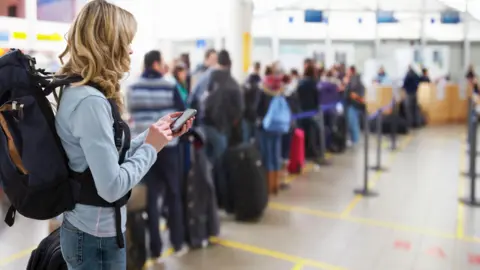 Getty Images
Getty ImagesIt might sound obvious but if possible, travel with hand luggage only and check in online before arriving at the airport to avoid queues.
But make sure your hand luggage meets the specific permitted dimensions of your airline, says Jane Hawkes, a consumer expert specialising in the travel industry, as they are not generic.
Other advice when flying includes:
- If you do have bags to check in and are staying or living close to the airport, you could try using a twilight bag drop or bag collection service, says consumer group Which?
- Arrive at the airport as per the recommended times given – usually around two hours before take-off for short-haul flights, and three hours for long-haul flights
- Keep all travel documents handy so they are easily accessible whenever needed
- Be “conveyor belt-ready” by taking off belts and shoes and removing laptops from bags in good time, and ensure liquids up to 100ml are in clear plastic resealable bags as appropriate
Ms Hawkes adds that holidaymakers should be prepared for delays due to the sheer volume of people travelling at this time of year, and take adequate provisions.
“Know your consumer rights before you travel so you don’t have to think on the spot in the event of inevitable delays or cancellations.”
Rory Boland, editor of Which? Travel, adds: “If you do find yourself stuck in a queue and your flight is due to depart shortly, make a fuss and ask a member of staff to take you to the front.
“If it looks like you’ll miss the flight through no fault of your own, it is important to tell your airline as soon as you can.”
Travelling by Eurostar or train
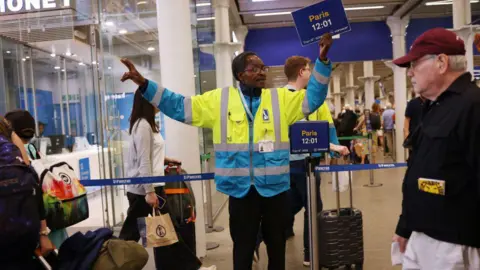 Getty Images
Getty ImagesEurostar was always expected to be busy during the Olympics, but on Friday the service was hit after “co-ordinated attacks” of vandalism in France.
As a result, one in four trains between London and Paris will be cancelled until Monday morning.
Eurostar is telling customers to cancel their trips where possible. They can do so free of charge and get a refund. You can check the latest travel updates here.
“Rail chaos in France affecting Eurostar clearly shows that you also very much need a plan B if travelling this summer – and a contingency pot to fund alternative plans if necessary until you can recoup any costs,” says Ms Hawkes.
For those that are able to travel:
- You’ll need to complete your Advance Passenger Information before you can get your tickets
- Arrive at the station at the recommended time stated on your ticket
- If you’re travelling from/to London, you’ll go through ticket, passport and luggage checks so make sure you have plenty of time as you won’t be allowed to board the train if you arrive after the ticket gates have closed
For those taking the train to somewhere within Britain, it will come as a relief that there is currently no planned industrial action on the railways, unlike in years and months gone by.
It is still worth trying to avoid travelling at peak times though, says Rory Boland from Which?. And things like broken down trains can still cause delays and so passengers are always advised to check their journey before travel.
Getting the ferry
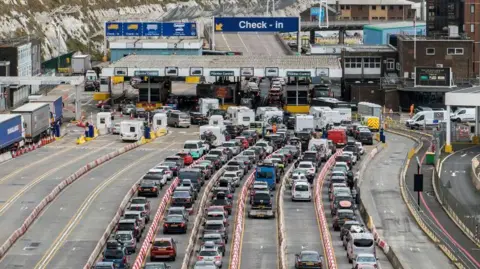 Getty Images
Getty ImagesDover is Europe’s busiest ferry port, and summer is its peak period.
The port’s boss has already warned this summer will be “exceptionally busy” due to travel for the Paris Olympics and while the port carries out work preparing for new EU border checks, which come in in the autumn.
Nevertheless, the port has some general advice to help passengers’ journeys run smoothly:
- Travel to the ferry terminal via main routes only and allow plenty of time for the journey
- Don’t turn up more than two hours before your booked ferry crossing, and don’t turn up without a booking
- Come prepared with sufficient food, snacks and entertainment
- Have passports open and ready before border controls to ensure the quickest transit
